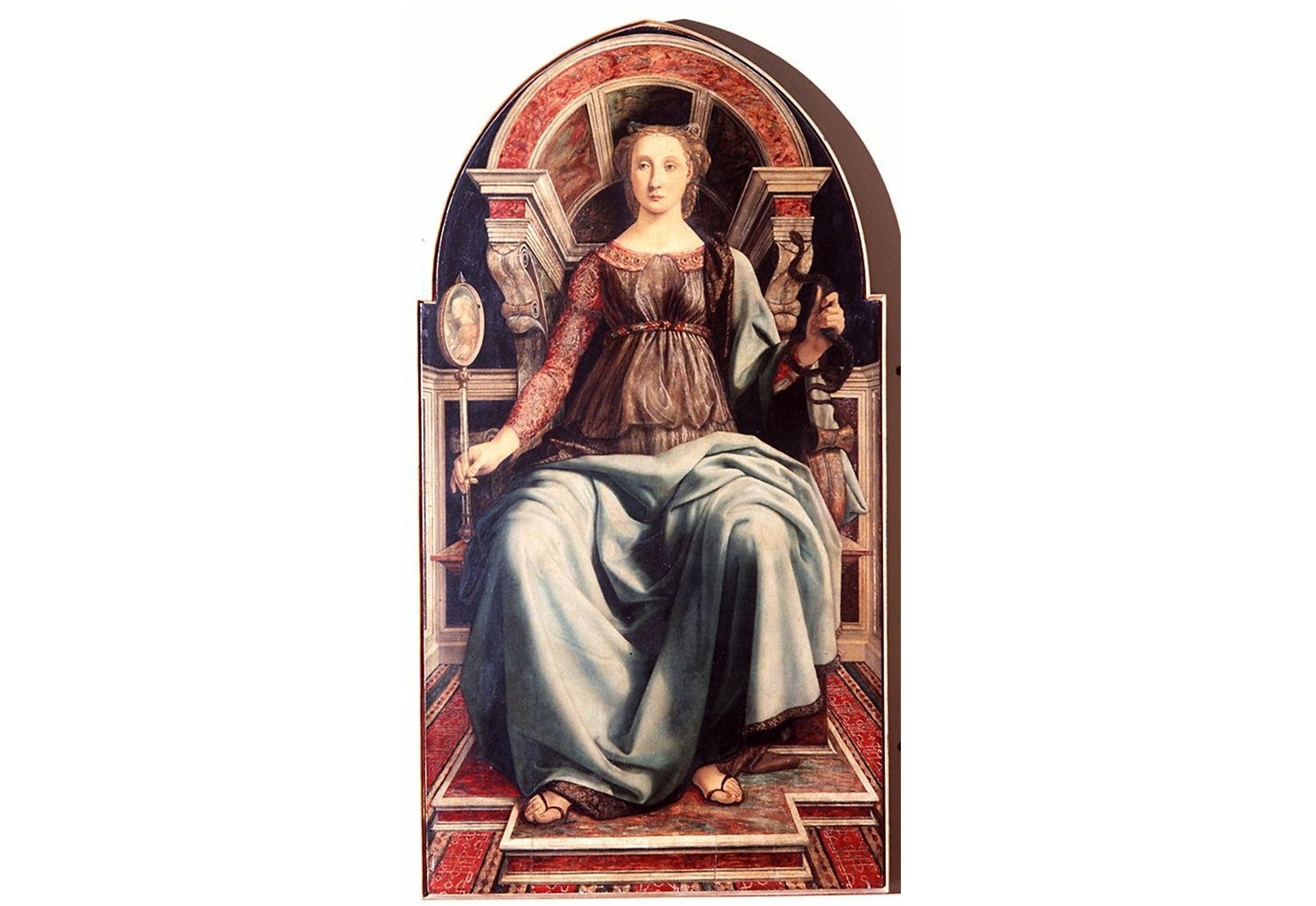+39 0669887260 | info@wucwo.org | Contact us
Art for meditation - June 2024

Piero del Pollaiolo (Florence 1441 - Rome 1496), Prudence, 1469-72, tempera grassa on panel, 168 x 90.5 cm, Florence, Uffizi Museum
The Virtues: Prudence
Pope Francis dedicated his Wednesday 20 March audience to the first of the "cardinal" virtues, prudence. And he reminded us that “Prudence is the capacity to govern actions in order to direct them towards good; for this reason, it is dubbed the “coachman of the virtues”. Prudent are those who are able to choose. As long as it remains on paper, life is always easy, but in the midst of the wind and waves of daily life it is another matter; often we are uncertain and do not know which way to go. The prudent do not choose at random: first of all, they know what they want, then they weigh the situation, seek advice, and with a broad outlook and inner freedom, they choose upon which path to embark”.
Piero del Pollaiolo, in the cycle dedicated to the virtues that we are now familiar with, also painted this 'cardinal' virtue with care and attention, and we find some features that have already been noted in the paintings examined in the last few months: the throne on which Prudence also sits, a carpet that decorates the floor, a marble predella that tends to raise the figure of the young woman.
The virtue of Prudence is also a young woman holding two things that somehow represent her. In her right hand we see a mirror reflecting the image of the woman herself. It is therefore above all a symbol of self-knowledge, which is the first and indispensable condition for doing good. But the mirror also allows us to see behind our backs, and is therefore a symbol of foresightedness and circumspection, enabling us to avoid the traps of evil. Meanwhile in her left hand, Prudence, holds a snake, and naturally our mind immediately runs to the passage in the gospel where Jesus invites his disciples to be ‘cautious as serpents (Mt 10:16). If we look carefully at the woman's face, we notice that Prudence's eyes are slightly squinting, because the painter wants to tell us that she must look in several directions, carefully and cautiously.
Also in the case of Prudence we are struck by the elegance and richness of the dress, with its sleeves of a damask fabric, the high belt at the waist that creates a play of folds with the lightness of the fabric, while the cloak, which we see in its plain grey colour (but whose richly decorated inner side we glimpse in the lining on the left shoulder), with its clearly delineated folds tends to build up the volume of the figure itself.
He who plans a thing will be successful; happy is he who trusts in the LORD! The wise man is esteemed for his discernment, yet pleasing speech increases his persuasiveness. Good sense is a fountain of life to its possessor, but folly brings chastisement on fools. (Proverbs 1, 20-23)
By wisdom is a house built, by understanding is it made firm; And by knowledge are its rooms filled with every precious and pleasing possession. A wise man is more powerful than a strong man, and a man of knowledge than a man of might; For it is by wise guidance that you wage your war, and the victory is due to a wealth of counselors. (Proverbs 24, 3-6)
The lips of the impious talk of what is not their concern, but the words of the prudent are carefully weighed. (Sirach 21, 25)
Hear, O Israel, the commandments of life: listen, and know prudence! How is it, Israel, that you are in the land of your foes, grown old in a foreign land, Defiled with the dead, accounted with those destined for the nether world? You have forsaken the fountain of wisdom! Had you walked in the way of God, you would have dwelt in enduring peace. Learn where prudence is, where strength, where understanding; That you may know also where are length of days, and life, where light of the eyes, and peace. (Baruc 3, 9-14)
Therefore, a bishop must be irreproachable, married only once, temperate, self-controlled, decent, hospitable, able to teach, not a drunkard, not aggressive, but gentle, not contentious, not a lover of money. (1 Timothy 3, 2-3)
Prudence is the virtue that disposes practical reason to discern our true good in every circumstance and to choose the right means of achieving it; "the prudent man looks where he is going." "Keep sane and sober for your prayers."Prudence is "right reason in action," writes St. Thomas Aquinas, following Aristotle. It is not to be confused with timidity or fear, nor with duplicity or dissimulation. It is called auriga virtutum (the charioteer of the virtues); it guides the other virtues by setting rule and measure. It is prudence that immediately guides the judgment of conscience. the prudent man determines and directs his conduct in accordance with this judgment. With the help of this virtue we apply moral principles to particular cases without error and overcome doubts about the good to achieve and the evil to avoid. (Catechism of the Catholic Church 1806)
(Contribution by Vito Pongolini)